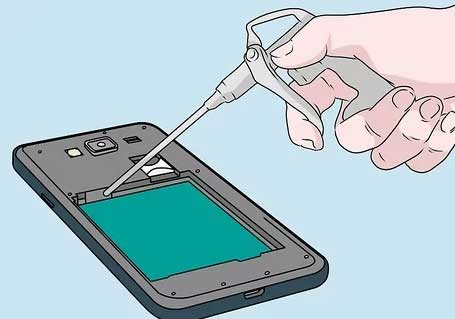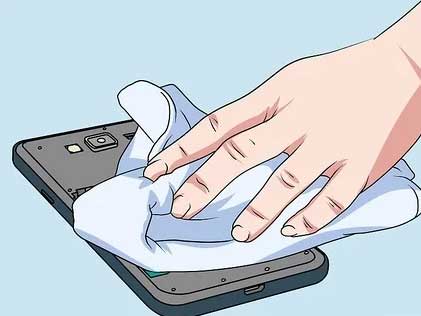Is Charging Your Phone While It’s Wet Safe?
1 Is Charging Your Phone While It’s Wet Safe?2 How Do I Get Water Out of the Charging Port? iPhone/Android users2.1 Get Rid of Moisture2.2 Leave it for Evaporation 2.3 Use a Portable Charger2.4 Speak with customer support2.5 Other Approaches: Myth or Useful?2.5.1 1. Dry in the sunlight2.5.2 2. Try to Dry your Phone inside the Jar of Rice2.5.3 3. Fabric Wipe2.5.4 4. Try through hair Dry2.5.5 5. Allowing Your Phone to Rest3 False Liquid Detection Alerts: How are they Fixed? iPhone/Android Users3.1 1. Turn off the Moisture Alert3.2 2. Upgrade Your Device3.3 3. Replacement of the Charging Cable3.4 4. Reboot your device in Safe Mode3.5 5. Check the Charging Port for Rust.3.6 6. Consider a Complete Factory Reset.3.7 Conclusion
While it’s still wet, charging your phone can result in unwanted issues. Both the charging cable and the pins inside the charging point are susceptible to damage. These could stop working, which would affect the mobile device accessories and the charging port. In the worst-case situation, charging a wet smartphone could result in electric shocks. Therefore, charging a phone while it’s still wet is never a good idea.
How Do I Get Water Out of the Charging Port? iPhone/Android users
First of all, we strongly advise against clicking the “Emergency Override” option. Hold on, don’t be alarmed. Get rid of the extra water by gently tapping on your phone. When working with electrical cables, wear gloves. Furthermore, avoid attempting to insert any pointed objects into the charging port because doing so may interfere with connectivity.
Get Rid of Moisture
The first step that needs to be taken by users is to dry off all the Moisture from the charging port’s surface in order to fix if your phone accidentally dropped into the water and now you want to get water out of the charging port. You can reach for a towel, but using a soft, light fabric cloth will absorb more quickly. The towel should be gently rubbed inward to absorb as much Moisture as possible. Be gentle; being hard may harm the port or force additional water inside. Allow your phone to dry naturally for 30 minutes or so.
Leave it for Evaporation
Waiting for the Moisture to evaporate gradually is the best method to get water out of the charging port. The Moisture that has been retained inside the port should often disappear on its own after a few hours. Be sure to place your gadget in a well-ventilated, upright position.
Use a Portable Charger
Use a wireless charger if the above solutions don’t work to charge your phone using a charging cable after you get water out of the charging port. Before you plug your phone in, make sure it’s dry from the outside at the back.
Speak with customer support
If none of the above techniques works and you are aware that the charging port is broken, you could try contacting customer support. Users of Android can access their help page by visiting their official website. Even better, you can get prompt assistance by going to the nearest walk-in service centre. Visit the company’s website and navigate to the Apple Support section if you have an iPhone. If the above repairs don’t work, you could also try taking your iPhone to a nearby walk-in service centre.
Other Approaches: Myth or Useful?
There is plenty of advice available for simple fixes to get water out of the charging port. If you’re in a hurry, you might want to attempt some of these fast and easy methods, but the majority of them are ineffective and may even harm your device more. Let’s clarify some myths that are widely held yet actually cause more harm than benefit.
1. Dry in the sunlight
It’s a widespread belief that letting your phone dry out in the sun would work as a solution. But did you realize that exposure to the sun for an extended period might permanently harm your device? High temperatures have the potential to seriously harm your phone’s internal parts. It can cause the battery to overheat and the tiny circuit to bend, permanently damaging its internal components. Additionally, exposure to sunlight for an extended period of time might break the screen and create blurriness, which makes the touch-screen unresponsive.
2. Try to Dry your Phone inside the Jar of Rice
Placing your moist phone inside the jar of rice grains is another common method for speeding up the drying process. It’s a tried-and-true technique for getting water out of your wet equipment. As common as the method may sound, it may really cause more harm to your phone. While rice can absorb Moisture, it may also leave behind tiny dust and dirt inside the USB port, which might cause extra issues. Silica gel packs could be kept nearby as an alternative to get water out of the charging port.
3. Fabric Wipe
Another dangerous idea is inserting a cotton ball inside the port. It is never a good idea to force anything inside. A cotton ball pushed inside will either force more water inside or, worse yet, could weaken the port’s connection points.
4. Try through hair Dry
Also, refrain from using a blow dryer. Blowing air into the port may cause the water to go deeper within, which is more detrimental than beneficial. Heat-sensitive parts include the battery, seals, and screen. The sections of the port can be harmed by blowing hot air straight into it. Despite the fact that some phone parts can withstand heat, sensitive internal parts can be damaged, so it’s better to keep your phone away from hair dryers.
5. Allowing Your Phone to Rest
You shouldn’t leave your phone sitting around while it’s still wet for too long since corrosion can develop as a result. This process is slowly damaging the internal components of electrical devices. You can see corrosion buildup over the few weeks it takes for the environment to adjust.
False Liquid Detection Alerts: How are they Fixed? iPhone/Android Users
Even when you get water out of the charging port, there are situations when you receive misleading moisture detection alarms. Here’s how to fix the issue:
1. Turn off the Moisture Alert
If you are assured that the port is dry, you can turn off the moisture detection alert in the settings.
Access SettingsSelect Battery Usage.Click Recent Battery Usage at the bottom of the page.Select Android System.Then click on Force stop.
2. Upgrade Your Device
Minor issues can be fixed by updating the OS. If there has been a software update, your problems with bogus liquid alteration may be fixed.
3. Replacement of the Charging Cable
Examine the charging wire to see whether it is damp or if any damage has resulted in false alarms. You may disable these alerts by switching the charging cable.
4. Reboot your device in Safe Mode
After a power cycle, you can restart your phone in safe Mode if you still get false alarms. Users of Android:
Turn off your phone for a short duration of time.For two to three seconds, hold down the power button. Confirm Restart in safe Mode should appear as a pop-up notification.Click the “OK” button.
Users of iPhones:
Turn off your iPhone for 30 seconds.now switch on your iPhoneHit the side button while it is turning on until the Apple sign appears.Your iPhone automatically enters Safe Mode when you restart it.
5. Check the Charging Port for Rust.
False warnings may be generated by rust or other tiny particles that have become lodged inside the port. Check with a flashlight, but avoid inserting any pointed objects.
6. Consider a Complete Factory Reset.
You might wish to choose a “Full Factory Reset” if nothing else works. It’s critical to understand that a complete factory reset will erase all of your data, including contacts and photos. Decide to have a storage backup, therefore. It’s recommended to do a full factory reset at the very end after all other options have failed because it cannot be undone. Users of Android:
Access Settings.Then select Reset and Backup.Then, tap the Factory Data Reset button.Now, choose Delete Everything.This might change depending on the model and the brand you’re using.
Users of iPhones:
Access settings.Go to General Settings.Next, select Reset iPhone.Then, choose “Reset All Settings” from the menu.
Conclusion
Your phone is now entirely dry if you don’t see any additional changes in its moisture/liquid sensing settings. So, now you know how to get water out of the charging port. Therefore, now enjoy using your phone. We hope that you find this article helpful. But, for any further queries, comment below and let us know. RELATED GUIDES:
How To Charge Apple Watch Without Charger?How to Fix Apple Pencil 1st & 2nd Gen Not ChargingHow to Get Rid Of Scratches on Apple Watch ScreenGet Water Out of Charging Port in Laptop/MobileHow To Fix Samsung Galaxy Z Flip 4 Not Charging IssueFix AirPods Case Not Charging IssueHow To Clean Your iPhone Charging Port Easily
Δ





